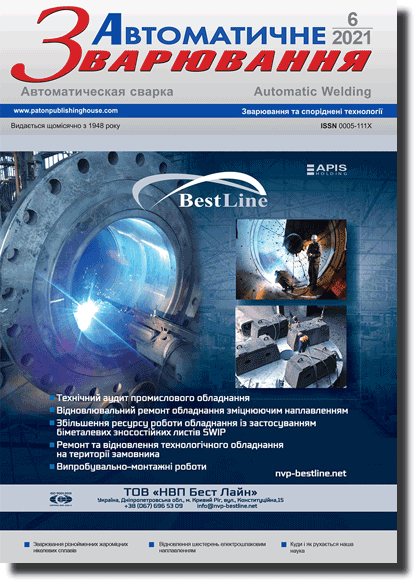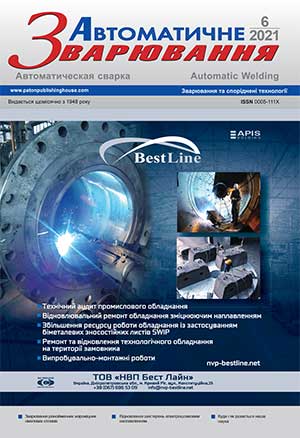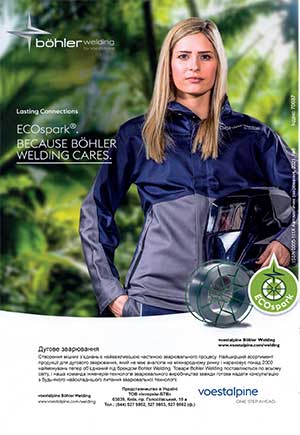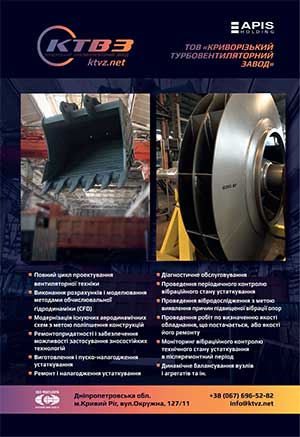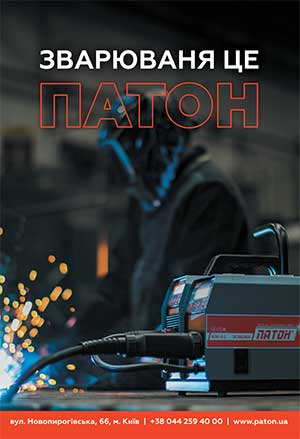| 2021 №06 (02) |
DOI of Article 10.37434/as2021.06.03 |
2021 №06 (04) |
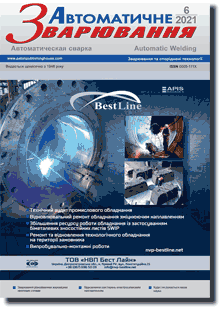
"Avtomatychne Zvaryuvannya" (Automatic Welding), #6, 2021, pp. 21-28
Modeling the effect of electromagnetic field on the structure
S.Yu. Maksymov, O.M. Berdnikova, O.O. Prilipko, T.O. Alekseenko, E.V. Polovetsky, A.A. Radzievskaya
E.O. Paton Electric Welding Institute. 11 Kazymyr Malevych Str., 03150 Kyiv, Ukraine. E-mail: office@paton.kiev.ua
The developed computer application Proj5.exe implements the idea of a sequential calculation of values, where the value of welding current/voltage and current/voltage in the inductor of external electromagnetic infl uence is selected by the researcher. This allows increasing the effi ciency of research works with a minimum number of underwater experiments. Using the obtained parameters of the external electromagnetic fi eld, underwater deposits were performed on a plate of low-alloy steel 09G2S using PPS-AN1 fl ux-cored wire. The studies showed that the use of external electromagnetic eff ect facilitates the refi nement of the grain structure of the deposited metal and reduction in the share of non-metallic inclusions at their noticeable dispersion. In addition, in the metal of the heat-aff ected-zone, the parameters of a package structure of bainite decrease and a more uniform level of microhardness during refi nement of the substructure is observed. The external electromagnetic fi eld signifi cantly aff ects the dislocation structure of the metal, contributes to its uniform and gradient-free distribution, which causes a uniform level of dislocation hardening in the local volumes of the structure and a decrease in the level of local inner stresses. 11 Ref., 7 Fig.
Keywords: underwater welding, welded joints, low-alloy steel, external electromagnetic influence, microstructure, microhardness, lower and upper bainite, dislocations, local inner stresses
Received: 14.04.2021
References
1. Ryzhov, R.N., Kuznetsov, V.D., Prilipko, E.A. (2005) Procedure of calculation of control electromagnetic action parameters in arc welding of structural steels. Vestnik NTTU KPI, 45, 176–177 [in Russian].2. Maksymov, S.Yu., Prilipko, E.A., Kozhukhar, V.I., Ryzhov, R.N. (2004) Application of external electromagnetic actions for improvement of mechanical properties of welds in underwater wet welding. The Paton Welding J., 11, 49-51.
3. Kosevich, F.M. (1978) Dislocations in theory of elasticity. Kiev, Naukova Dumka [in Russian].
4. Larikov, L.N., Falchenko, V.M. (1980) Influence of highspeed loading on mass transfer in iron. Influence of crystalline structure defects on diffusion and mass transfer at pulse action. Kiev, IPM, 30–32 [in Russian].
5. Tokij, V.V., Zajtsev, V.I., Filatov, B.P. (1973) About mechanism of formation of ordered dislocation structure of metals. Ukr. Fiz. Zh., 7, 1178-1181 [in Russian].
6. Tozoni, O.V. (1964) Mathematical models for calculation of electric and magnetic fields. Kiev, Naukova Dumka [in Russian].
7. Tozoni, O.V., Mayergojz, I.D. (1974) Calculation of three-dimensional fields. Kiev, Tekhnika [in Russian].
8. Petrushenko, E.I. (1966) Problem definition on calculation of eddy currents in bodies of arbitrary shape. Izv. Vuzov. Elektromekhanika, 11, 1181–1184 [in Russian].
9. Berdnikova, O.M., Maksimov, S.Yu., Prilipko, O.O. et al. (2021) Influence of external electromagnetic field on welded joint structure during underwater welding. FKhMM, 57(1), 60–68.
10. Maksymov, S.Yu., Berdnikova, O.M., Prilipko, O.O. et al. (2021) Influence of external electromagnetic field on parameters and defects of crystal lattice of metal of welded joints during underwater welding.The Paton Welding J., 1, 23-28. https://doi.org/10.37434/tpwj2021.01.05
11. Goldshtejn, M.I., Litvinov, V.S., Bronfin, B.M. (1986) Physics of metals of high-strength alloys. Moscow, Metallurgiya [in Russian].
Advertising in this issue:
The cost of subscription/purchase order journals or individual articles
| Journal/Currency | Annual Set | 1 issue printed |
1 issue |
one article |
| TPWJ/USD | 384 $ | 32 $ | 26 $ | 13 $ |
| TPWJ/EUR | 348 € | 29 € | 24 € | 12 € |
| TPWJ/UAH | 7200 UAH | 600 UAH | 600 UAH | 280 UAH |
| AS/UAH | 1800 UAH | 300 UAH | 300 UAH | 150 UAH |
| AS/USD | 192 $ | 32 $ | 26 $ | 13 $ |
| AS/EUR | 180 € | 30 € | 25 € | 12 € |
| SEM/UAH | 1200 UAH | 300 UAH | 300 UAH | 150 UAH |
| SEM/USD | 128 $ | 32 $ | 26 $ | 13 $ |
| SEM/EUR | 120 € | 30 € | 25 € | 12 € |
| TDNK/UAH | 1200 UAH | 300 UAH | 300 UAH | 150 UAH |
| TDNK/USD | 128 $ | 32 $ | 26 $ | 13 $ |
| TDNK/EUR | 120 € | 30 € | 25 € | 15 € |
AS = «Automatic Welding» - 6 issues per year;
TPWJ = «PATON WELDING JOURNAL» - 12 issues per year;
SEM = «Electrometallurgy Today» - 4 issues per year;
TDNK = «Technical Diagnostics and Non-Destructive Testing» - 4 issues per year.




